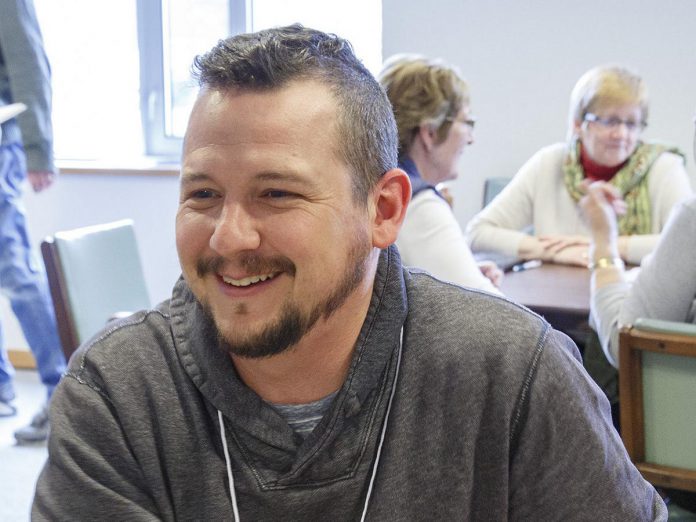One summer when the Warming Room in Peterborough shuttered the windows and locked the doors for the season, Christian Harvey learned some people who dropped in had nowhere to go until winter came again.
While they had a place to rest and find respite from the cold when temperatures dropped, they would be on the streets for the remaining months when the centre was closed. It was about seven years ago when One City Peterborough realized it needed to expand its scope beyond providing the Warming Room and outreach services.
“We needed to start to get into housing,” said Harvey, executive director of One City Peterborough, in a recent interview with kawarthaNOW.
“We had, at that time, a generous landlord who was wanting to work with us to make this happen. So (the landlord) basically bought a house and allowed us to use it to house people and that was sort of our beginning,” he said. “Since that time, we’ve grown quite a bit.”
One City Peterborough is non-profit charitable organization supporting people who have experienced homelessness and/or criminalization towards their full inclusion into the community. The organization now owns seven houses, five of which are designated for people transitioning from homelessness, and two that serve people upon their release from prison.
One City’s supportive housing program is designed to provide housing and community for people struggling with chronic homelessness and disengagement.
“We also started basically a non-profit property management business (which is) part of who we are,” Harvey explained. “There were landlords who wanted to be involved in the quest of ending homelessness but didn’t have the resources and/or skillsets to provide housing supports for tenants.”
“We partner with those landlords, and they hire us to property manage their homes. When we take those over, we focus those on individuals coming out of homelessness.”
One City Peterborough now manages six houses through arrangements with landlords.

In total, at the time of the interview, One City provided housing for 49 people. In addition to providing its tenants with a range of supports, One City also works with external organizations, including Fourcast Addiction Services, the Elizabeth Fry Society, and the Nogojiwanong Friendship Centre, as well as volunteers.
They collectively provide residents with help maintaining housing, connecting with the community, accessing health services, furthering their education, increasing their well-being, and supporting their individual goals.
“Everyone who is in our house is supported by someone,” Harvey said. “Some of them are supported by our staff, and (for) some of them we manage the properties but we partner with other agencies to offer the supports.”
The houses are somewhat like a rooming house but they’re more intimate — most of them are four-bedroom homes or smaller. Harvey said they began with larger properties but quickly realized those weren’t as ideal. Since the organization strives to provide a sense of belonging and a community for its residents, this worked better in smaller houses.
“We don’t want people to feel warehoused in their house,” he noted.
Residents have their own bedroom and share the amenities such as the kitchen and washrooms.
“Each home is a little bit different,” Harvey said. “We really try to have the homes …. self-determinant in a lot of ways. We may start with an individual and then build that home around the individual. That will set the tone.”
The “rules” vary from home to home, as tenants set their own boundaries that work for their particular homes.
“We focus on individuals who are coming out of homelessness, many of whom are coming from outdoors, who are living outdoors …. and allow them to have a say about who’s living in those homes.”
There’s no set time limit for how long residents can stay in the homes. While One City used to consider the program as transitional housing, the organization realized there weren’t places people could transition into in the current rental and housing market.
One City Peterborough’s supportive housing program works for a few reasons, Harvey said. The fact that One City owns the properties and provides the supports avoids some of the issues that can arise between service providers and landlords.
Secondly, since One City owns homes, “it takes houses off the market” and makes them available for those needing housing, said Harvey about the benefit of the model.
“So many of those who we support are left out of the market entirely. They will never be competitive in a rental market that has such low vacancy rates.”
“By removing these houses from the market, we are focusing them on individuals, and it becomes less about making a profit and more about making sure people are housed,” Harvey explained.
“We believe housing is a right,” One City states on its website.
One City’s supportive housing program is currently at capacity. When vacancies arise, the organization looks to existing tenants who may want to move to another house, and/or to other people who need somewhere to live and are accessing other One City supports, such as the winter overnight program and daytime drop-in program at Trinity Community Centre or outreach services.
Harvey said One City would love to be in a position to buy a house a year, but it doesn’t receive government funding to pay the wages of the people who provide supports to the homes’ residents.
“We do it all through our own fundraising,” he pointed out.
The average cost of supporting an individual in the supportive housing program is approximately $250 per month.
To learn more about One City’s supportive housing program or to make a donation towards the costs of running the program, visit www.onecityptbo.ca/housing.
Landlords interested in leasing a property to One City for the supportive housing program can contact One City’s housing director Michael Vanderherberg at mvanderherberg@onecityptbo.ca to learn more about how the program works.



























